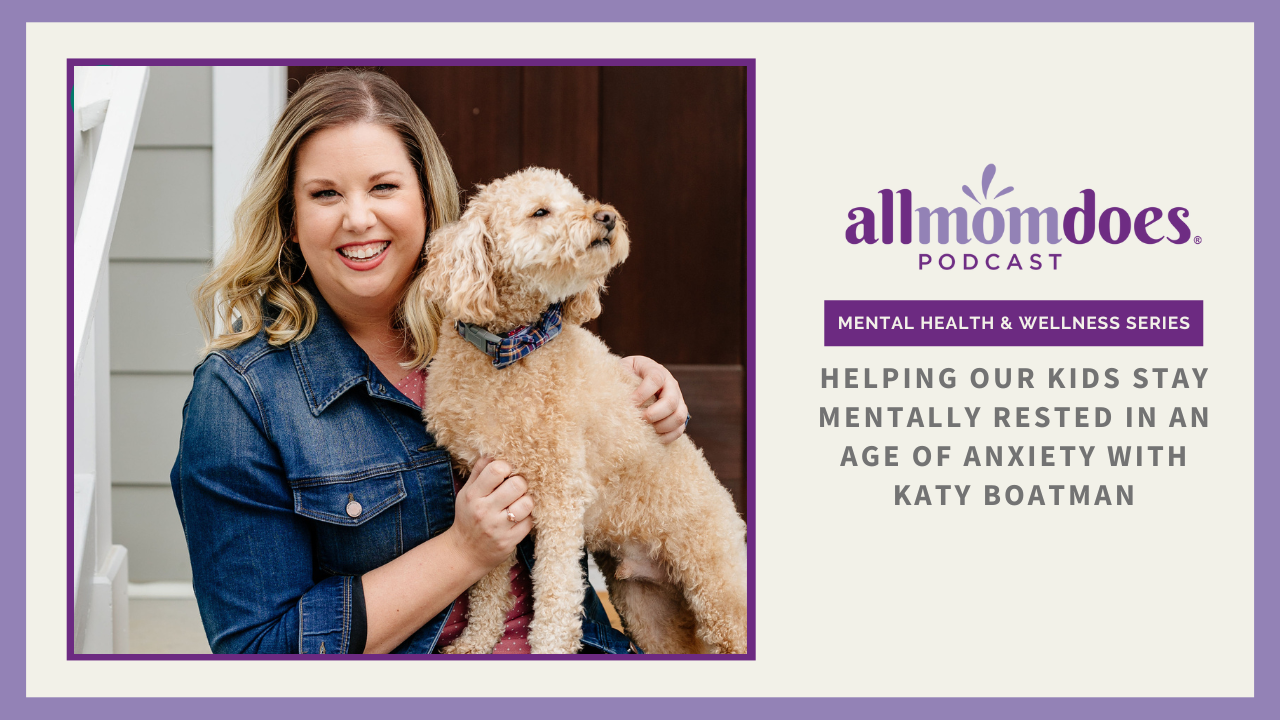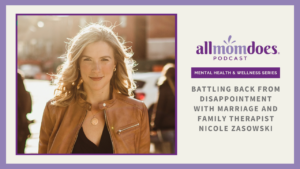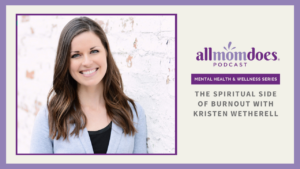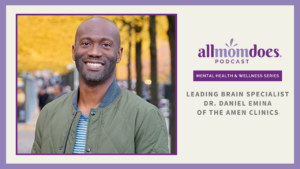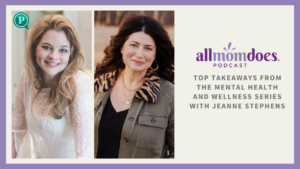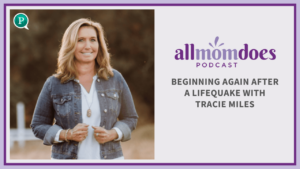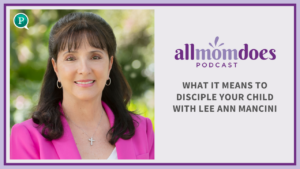A chat with her young niece made Katy Boatman realize just how much kids today struggle with anxiety and fear. So she did something about it.
Katy joins The AllMomDoes Podcast host Julie Lyles Carr and talks about recognizing and addressing anxiety, stress, and exhaustion in our kids today, and how to equip them to apply the comfort and love of God toward their feelings.
Interview Links:
- Find Katy Online | Instagram | Facebook | Twitter
- Book: You Can Rest: 100 Devotions To Calm Your Heart And Mind
- Song: You Can Rest (Hillary Scott)
Transcription:
Purposely. Your life. God’s purpose. Listen at onpurposely.com.
Julie Lyles Carr: Before we jump into today’s episode as part of our special series on mental health and mental wellness, I have a favor to ask you. Something I really could use your help with. We are putting together a special episode. It’s going to be coming up soon with our top listener questions and I want to hear from you.
Would you please send in your questions for me – whether it has to do with parenting with mental health and wellness, with marriage, with your faith walk, with work, whatever it is we want to hear from you. And if you would send those questions to [email protected]. That’s [email protected].
We’re gathering up those questions over the next few weeks, and then we’re going to have a special episode just for you. Now for today, we continue our special series on mental health and mental wellness. You’re on the AllMomDoes podcast and we’re getting such incredible feedback from this series. I’m so thrilled that you are going to be able to encounter yet another person who has some incredible insight and wisdom and tools for us when it comes to being the most wholehearted and healthy that we can be about the way we think, about the way we feel, and how that impacts just about every component of our lives. So let’s jump in to today’s episode.
I have Katy Boatman with me. I’m so excited for you to get to hear from her. She has done a deep dive over the past year because of the passions in her heart for working with young people, she’s had a real passion to unpack what anxiety looks like and how to make sure we get resources into the hands of our young people who can help, that can help with this thing we call anxiety. Katy, thank you so much for being with me. Absolutely. Well, tell listeners where you’re from and what you do for a living and all that.
Katy Boatman: Yeah, I live in Nashville, Tennessee. I’m originally a Georgia girl, but I’ve been in Nashville about 13 years now. So it definitely feels like home. And I am a writer and also a marketing and communications girl. I worked full time for IF: Gathering women’s ministry and I also am heavily involved in student ministry and that looks really different throughout my life.
Like in different seasons sometimes it’s leading a small group of girls. Sometimes it’s, you know, mentoring one or two or having a Bible study in my home, but specifically in the last like year or so, it was really been pouring into kind of the pre-teen age of 8 to 12 and that’s because of my niece Shelby and some conversations that we have had about things that she worries about.
And so that’s really kind of inspired just a each dive in the last year or so.
Julie Lyles Carr: Katy you’ve been working with IF for a long time, Jenny Allen I’m in the Austin, Texas areas. So when Jenny was getting all of that rolling and there are a lot of women here in the area that I’m acquainted with colleagues with who have been part of that.
IF has had such a huge movement, and of course, Jenny’s now in the Dallas Fort Worth area and it, and so the IF conference, the in-person conference has moved to the Dallas area and has all of this beautiful digital footprint, including women across the nation who may not be going to Dallas to go to IF.
But part of where I see some really beautiful things happening is this desire for a lot of people engaged with IF to speak to that younger generation. You were talking to your, about your niece and some of the things that you’ve seen her undergoing, what are some things that you’ve begun to notice from your vantage point in ministering to women? When it comes to our young people, what are some things that you’re seeing that have really piqued your interest in how we need to be pouring into the next generation?
Katy Boatman: I think there’s a real curiosity there in this next generation. There’s also a boldness that I’ve seen where they’re not really afraid to ask questions.
They’re not afraid to take big steps, but they obviously need some guidance and some leadership because at the same time, with those things being true, they’re also like most anxious generation and everything that we’re experiencing as adults, especially in the last two years they have as well. And so I think, you know, this statistics pre pandemic are crazy, but statistics, post pandemic, which I think are still being assessed and coming out, I know are like even higher and, so, because of that I think with this generation, who’s like, who’s curious and willing to talk about their feelings I think that’s where we as adults have the honor and privilege to come alongside them. Because even when I look back at my upbringing, it really was women ahead of me who were like, Hey, let me, let me sit down with coffee with you.
Let me just like show up to your school activities and kind of walk in life alongside you. And we really, you know, from a biblical standpoint, we call that discipleship, like, let me walk alongside you, but also show you who Jesus is. So that I can show you where the hope is. And so I think this, this next generation is really open to that.
But it’s going to start with relationships because they can see right through anything that’s not authentic.
Julie Lyles Carr: Right? Right. I love that you bring up this, this notion and it’s a right notion. I see it myself. I would, I would call it fact that this is a generation coming up behind us who are not afraid to ask hard questions.
And frankly, we have issues in the faith community right now that deserve some hard questions. And I can remember there was a period of time when I would have some questions that I wanted to ask. And sometimes I was told you just have to have faith. You just have to have faith. And it was sort of this hop, skip and jump where it didn’t feel like I was getting the kind of mentoring – that ability of someone to sit down and be honest and go, that’s a really awesome and hard question. It, I didn’t find that to often be true. And I, I want that to change desperately. I’m hoping I’m changing that in the women that I’m mentoring, who are coming up after me. What do you find are some of the top questions that these young people you’re working with have today when it comes to their relationship to faith?
When it comes to complexities in the world, when it comes to, frankly, the failures you were seeing in a lot of very well-known Christian leaders and how that then informs what the next generation is perceiving about walking in a life of faith? What are you seeing are some of the trends when it comes to these hard questions that are being asked?
Katy Boatman: Yeah. That’s such a big question to unpack. I think they want to know if God really is who he says he is. And I think a lot of that comes from the fact that we as people following Christ have gotten it wrong so many times. So they’re seeing this experience or they’re, or they’re experiencing things where, what we say we believe does it actually match up with the way that we live.
And so. I think that because of their curiosity and their boldness, they are asking those hard questions, but they have got to be able to see us be humble, walk in forgiveness and actually dig into these deep questions with them. And I think one thing that we’re not so great at sometimes as adults is just being like, well yeah, like, like you said, just have faith or let’s just look at this one Bible verse, but actually being okay with saying, you know, what, I don’t know the answer right now, but like let’s open our Bibles. Let’s dig in it together. Let’s find a resource or something where we’re actually just coming alongside them and saying like, I’m growing in my walk with God too. And I think there’s a real importance in that. Just humility and authenticity. Like I said, because there, there is something in this age group where the minute that they sense that you are not being real, that you’re being fake or anything they’re just, they’re done. And so, yeah, I just, I think they want to know that God really is who he says he is. And we have to you know, be able to show them that.
Julie Lyles Carr: I can imagine that for young people trying to determine their faith walks, there’s a level of anxiety that happens when there is this – what feels like a gap sometimes between what you’re experiencing in the world and what the faith community is telling you that a walk with God should look like. That what His personhood, if you will, is his essence is all of these things. And yet it sometimes is easy I think as adults, when we are stressed about getting the mortgage paid and getting our taxes in on time and making decisions about health care and making decisions about marital relationships and all of these things that can carry with them, tremendous layers of stress, it can trigger anxiety in us. And oh yeah, let’s throw it all into the middle of pandemic, which, you know, this is all of our first pandemic. It all plays out. We’re still trying to tap dance and improv as we go. I think it can be easy to look at a younger generation and think, what do you have to worry about?
You’ve got a roof over your head. You’ve got food on the table. You’re not having to think about this, that and the other. What do you find that younger people are experiencing anxiety about? And how can we make sure we’re doing the heart check to walk an empathy with that to not pull out things like, well, when I was in high school, it was this, well you think that’s rough listen to how we had to do dah, dah, dah, or let me tell you about my life today and then you can tell me why you think you’re so upset. What are the things we’re looking for in terms of what young people are experiencing anxiety over? And how can we engage in empathy that actually comes alongside them and really helps? Is not pushing back and telling them that their anxiety is somehow invalid?
Katy Boatman: I actually sat down with my niece, Shelby and her friends. This would have been like the end of 2020, and I asked them, I said, can I just ask you some questions about what it is that you’re worrying about and like, what makes you scared? And I know anxiety, there’s such a different level. Like there’s, there’s worry. And then there’s anxiety, which is like a whole different level. And also oftentimes like diagnosed is an actual, like real thing that needs to be addressed with professionals. Right. But on that level, they were saying a lot of things that honestly are things that I think we struggled with as kids too, they were saying everything from –
I worry about what people think about me. I worry that I’m not prepared, which I think is a huge one, considering what we’ve all just lived through. Like we don’t, we don’t know how to prepare for the next day anymore because we don’t know what’s coming. What else? And then there’s also simple things of like I, I worry when my mom and dad go out of town, like, are they gonna come back?
Worrying about illness because that’s, you know, a new reality for sure. Worrying about then the normal things of grades and performance. Am I measuring up to what my parents are expecting of me? And so I think, yeah, we often, as adults can be like, oh, you’ll be fine. You know, like we lived through it, you got this, no problem, but just allowing ourselves to step back for a minute and listen is super important and hear what it is that they’re saying.
And like, even if there’s something at a deeper root level, Like, what’s the real thing that’s really bothering you. And just being empathetic, like you said, and hearing out what they have to say and walking with them in it. And instead of just throwing a like, well, when I was your age story but really just, you know, using that listening ear and, and letting them know that we, we see you, we hear you.
And we understand that like what we’re experiencing now in the anxieties as adults that we’re experiencing, they are too, it may be a different level but they are too.
Julie Lyles Carr: I think it’s really interesting that place where you’ve identified that young people in those junior high high school ages are saying, I don’t how to prepare.
I don’t feel prepared. I don’t know what’s coming next. You know Katy part of what’s interesting to me about that is I even take that, not from necessarily just a pandemic level, but I think about when I went to college and I can remember my parents saying, okay, you want to pick a major because that’s going to be your career.
And for my parents, that was true. My dad went into all manner of astrophysics and all kinds of stuff in engineering and became a rocket scientist. And my mom went to school to become an accountant and they became those things. You went to college, that’s what you were. When I went to college, it felt a little more vague.
Although there were definitely still people who were showing up getting the degree in the specific thing, and then that’s what they were going to do forever. I think I always had an entrepreneurial and ministerial heart. I didn’t know that at the time. And I had no category to be able to place that in. And so my degrees ended up being in psychology and an English literature, which turned out was just exactly what it needed to be, to be in journalism and television, radio, as an author, a speaker like that all worked out, but I can remember feeling very unsettled because it felt like people around me had a better heading for what they were going to do. We fast forward to today’s generation. And so few people go to school for the thing they’re going to be. And I know from research that I did for my book, Raising an Original that today’s college freshmen will most likely change their major five times on average, there are people who changed their major even more than that. So I feel like for a lot of young people, some of the things that we used to do to give a sense of preparation for what was coming in the next season of their life really aren’t there anymore.
And part of it is simply because technologically we’re moving so fast. As a society, there are jobs that we know that will be taken over by AI within the next 2, 3, 10 years. And so why would you get a degree in that? Things that people used to love to go into, for example, if you went into education and you could build a life from being a teacher from being an elementary school teacher and the pay was there to make sure that happened.
Those things are going away. You know, we hear stories all the time with people, with student debt that is huge, and there’s no way they’re going to be able to pay for that student debt because they went into education and we’re not paying teachers what they’re worth. I can see that for young people today so many things that used to be markers of planning ahead and planning your future. Even if God intervened and things went a completely different direction, but the sense that you had a path you were on, it feels like to me, a lot of those things are missing. Do you hear some of that from the young people that you’re with that, yes. There’s the issues that we can’t plan ahead because of pandemic life, but there’s also just a place where it’s become a whole lot more nebulous about how you step into your future.
Katy Boatman: Yeah. I think that’s real and I’ll be honest. I haven’t had conversations with a lot of like graduating seniors in a minute. It’s been a few years since I’ve been in direct, you know, ministry with seniors. But I think what we’re seeing yeah. Across the board is that it’s no longer about this career path that you’re building. Like you said, it’s often like you graduate and they’ve got to follow, like the one thing they think they’re excited about.
And there’s also the new, you know, the new kind of path of am I going to take a gap year? Like college used to be expected. It’s not expected anymore. And so I feel like honestly, For me, if I was graduating in this time, it almost feels like I’d be in decision paralysis because there’s so many options of things to do.
Where when I graduated, I felt like it was, it was just this kind of expected thing. I’m going to go to college. I’m going to do the degree. That makes the most sense. And then I’ll figure it out from there. So I think it is a, it’s a tough spot for them to be in. And yeah, I, I know, I wish I had this like grand piece of wisdom on that topic specifically, but I actually feel for and empathize with that age because I think they have more options than they ever have before, which is both a good thing and a hard thing when you’re that when you’re 18 and you’re like, ah, what do I do with my life?
But again, that’s where I see such an importance of parents mentors, you know, youth pastors kind of coming alongside them and being like, let me help you figure this out. Like, what’s the best next step for the next one year, two years, four years, instead of saying what’s the best next step for your entire career? Cause that’s, that’s gone for sure.
Julie Lyles Carr: I love that piece of advice. You’re so right. Sometimes we come alongside a young person and we are trying to structure for 10, 15, 20 years out. I read a tweet today, Katy, that I thought was so funny where somebody said let’s face it. Anybody who was asked in 2015, where do you see yourself in the next five years? They got it wrong.
And you know, if there’s anything that this season has taught us, it’s that, sure, plan, what you can, but there are just things that do come along that are going to change, not just in individual lives, but can actually change on a global scale. And so to pretend as adults that you lay out the plan, and this is the way it’s going to go and then we’re coming alongside young people, trying to mentor them that way? And it’s kind of silly right now. I love this idea of saying, how do I help you for the next year, the next two years? It’s interesting. I also recently saw an interview with someone who said the way that we put together, our schooling for our kids actually can create some interesting anxiety in this way.
We look at the high school career, if you will, and it’s four years. And then we look at the college career and for most people it’s around four years. And we then launched people into young adulthood and they think that if they haven’t accomplished X, Y, Z within four years now, then they’re behind and that can be anxiety inducing in and of itself.
And so some of the very structures we put in place can really be problematic. So what a great tip to just help somebody figure out the next step for maybe just the next few months or the next year?
Katy Boatman: Yeah. I think what you just mentioned is a real thing, because I even noticed in myself I’m 35 now, but I noticed in myself, in my twenties specifically when I would hit a four year mark at a job, I would start feeling restless for some reason. And I’d always be like, what, what am I doing? And I realized it was because we’ve been like trained in these segments the four year kind of segments. And, and so my brain was almost trained to be like, what’s next? What do I do next? You know, what do I have to accomplish next?
And it’s a weird thing that we’ve kind of put into place. Yeah, we, I also would kind of hate in my early years of doing job interviews, I would hate the question, like, what’s your plan for the next five years? Because it’s, who knows. I’m like, let me tell you about my plan for the next year and that’s pretty much as far as I can go.
Julie Lyles Carr: I want you to know about an incredible healthcare solution that’s top-quality and affordable. Traditional health insurance is so expensive. And for a lot of us who are entrepreneurs or self-employed, or don’t have access to insurance through our jobs, it’s hard to know where to turn, to take care of our family’s healthcare.
That’s why I’m so excited about Altrua HealthShare. Altrua HealthShare is a community of like-minded people who share in each other’s medical needs while agreeing to live a healthy lifestyle. This keeps medical costs lower, and those lower costs mean a high quality affordable health care option for you and your family.
If you’re one of the 32.8 million Americans who don’t have insurance and who are looking for a great solution for your healthcare expenses Altrua HealthShare could be the right fit for you. To see how much you can save on your healthcare costs go to familyhealth.family. Altrua HealthShare, where we believe in caring for one another. That’s familyhealth.family.
One of the things that you’ve been working on a real passion project over the last couple of years has been putting together a devotional called You Can Rest, which is for young people. And to help them understand the ways in which they can through a devotional process learn to rest. Now what’s funny about the idea of talking about young people in rest is I can already, Katy, I think I can actually hear some of my listeners who have teenagers. Their eyes might be rolling because it feels like to them resting is what their teenagers seem to be really, really good at. I myself have twins who are 14 and one of them who I won’t name can sleep like nobody’s business. The concept of telling that teenager, you need to rest almost sounds counterintuitive because in my head I’m like, you need to get up and get some stuff done.
So distinguish for us in a season for young people where again, some parents would be saying, my kid is lazy. They’re not getting their homework done. They don’t want to do anything they’re laying around. They’re just sitting around playing video games or whatever they are resting all the time. How do you distinguish and help parents understand the difference between what may be some very prototypical teenage behaviors and what real rest is when we talk about young people.
Katy Boatman: Well, the book was really born out of the conversation with my niece, who mentioned that she needed something to calm and settle her mind at night before she went to bed. And so I started writing this, her 10th birthday was coming at the time and I was like, I’m just going to write her a short little devotional for her to read before bed.
I called it You Can Rest and I gave it to her and it was just 10, a 10 day thing. And then I started sharing it with friends and family and others, and it, it turned into an opportunity to write, you know, a hundred days with BNH publishers and put it out. And so in this sense, what I mean by rest is actually way more than physical sleeping and physical resting, but it’s a resting of our mind and it’s settling our minds and remembering that there is a God who cares about every single thing flowing through our mind and every single worry and anxiety that we have and that he wants to be our safe place. And just this reminder that he truly is with us every step of the way. And so because of that, he is the reason that we can rest. And I know that there are a ton of kids and teenagers out there where it’s going to take more than a book to really get the help that they need. There’s some, you know, who have diagnosed depression and anxiety who need the support of professionals or medication as well. But if I can use this resource as one tool that they can use a day to read this one devotion a day before they go to school, or as you know, the day is ending and before they go to bed, just to remind them. Hey, what you’re feeling is not weird. And we all have all kinds of feelings. And especially as like a young girl, our emotions are all over the place. Right? And so just this reminder that God is powerful and mighty and can carry those things and can be our protector and our healer and our safe place.
So that’s really where the rest part comes in. It’s a resting of the mind.
Julie Lyles Carr: Resting of the mind. I love that you have created a resource that can come alongside some of the things that I already see my kids, my young teenagers doing. One of my kids has a podcast that they listen to every night. It’s the same episode. I don’t understand this, but this is what they do for whatever reason. It really helps calm this kiddo’s mind. And it’s part of their ritual, their bedtime ritual. And I love this idea of, instead of it being something sort of just out there, like a song or a podcast, or reading themselves asleep in just some variety of material, that this is something that is really targeted to speak to the mind and the heart about resting in God through the night.
It reminds me a little bit Katy of how we would take our kids and, you know, say nighttime prayers with them and sing a little song about how God was going to watch over them through the night and they age out of that to some degree. And you sort of forget to be intentional with how your kids are creating ritual around their nighttime habits.
At some point, I think for a lot of parents, myself included, once you get past that place of when you’re trying to tuck them in and keep them in bed every night when they become a little more independent. You’re really just mainly checking. Hey, did you brush your teeth because we’re paying a lot of money for those braces.
And did you get your, did you get your rubber bands on that you’re supposed to have, they’re aligning your jaw. Like sometimes that’s, as far as the nighttime routine goes, as our kids get older and move into those late elementary, junior high and high school years. So what a beautiful way to reincorporate that as something they can do as something that they can take a look at.
What was the most surprising thing to you about coming up with 100 of these? Did you find it to be easier, harder? And what did you have to tackle within your own spirit and mind as you were going through the composition of these.
Katy Boatman: Yeah, I, I started out and I was like, you know, a hundred is really, it’s a big goal here that we have to come up with those topics.
But it honestly wasn’t that hard because there are just so many different things between friends, school, our parents, our family relationships, illness, like all the things that they worry about. And then also like the things that they don’t know and worry about God, like one of the days is like, is God going to give up on me?
And so even though I thought it was like really daunting to come up with a hundred ideas, it ended up not being. And like I said, when I sat down with Shelby and her friends, I asked them like, what do you worry about? And I asked them if I could write it all down and I did. And so I really used their talking points as my launching place to write.
And I was so, so grateful that they allowed me to do that. And they they’ve kind of been a part of the process along the way, too. I mean, even like sending the book cover, I texted their moms and was like, show the girls, like, which book cover do you like? And they came and did a video with me. And honestly they’ve played a huge role in just providing all of that.
And what’s funny too is I feel like as I was writing it, God was also teaching me and reminding me that he had it under control because this was the middle of the pandemic. And I experienced anxiety while writing it, like I had never experienced before. And it wasn’t just because of the book project. I mean, it was, you know, writing that on top of a full-time job in the middle of a pandemic, like all the things were adding up and I was experiencing like physical reactions to anxiety that for a second, I didn’t even know what was happening and.
I remember being like, okay, God, like number one, of course, you’re going to remind me as I’m writing that these words are true, that you truly are my safe place and that you truly can provide. And I think that’s probably the biggest thing that I walked away with is that he just provides, like, when we pray, like God give us this day, our daily bread, he will.
And it’s not always that I understand what I’m asking for in that day. Like, I may be like, I need… I need words. And sometimes he provides that and sometimes he doesn’t, but I know that he is for my good and he’s providing what I need no matter what. So yeah, it was, it was definitely a process in doing all that, but I learned a lot in it.
Julie Lyles Carr: I love that you recognize your own anxiety and trying to get this project across the line. Tell me how as parents, because here’s where I think it’s, it gets interesting sometimes. We’re watching the anxiety of our kids. We’re trying to process where this is coming from. We ourselves might either be very self-aware that we are someone who’s wrestling with anxiety, and we hate to see our kid going through it.
And so we’re really frustrated in a sense, because we don’t want them to experience the same thing, or we may not be aware of the anxiety that we’re grappling with. It may come out in different forms. For myself, a lot of times my anxiety looks like overachievement, workoholism. It doesn’t look like the anxiety that some of my kids have really grappled with.
Theirs looks very different and yet it’s been really important and I’m still working on this Katy to come to terms with my own version, my own style of anxiety and understand how it’s potentially influencing and also accelerating sometimes the anxiety in my kids. How can we do that self-check as parents, as devoted aunts, as mentors, as teachers, to young people, to be cautious about where we’re letting things bleed over or we’re, we’re just, you know, we’re just not self-aware about how we may actually be creating even more momentum underneath our young people’s anxiety.
Katy Boatman: Yeah. I think that’s where we have to dig in and kind of do our own work too. And, you know, if it means meeting with a counselor or a therapist, or it means like picking up some books and figuring out what it is that we’re feeling and experiencing, and how do we need to address that?
Like, what do we. Do we need consistent counseling? Do we need to tell this to like two best friends who are going to hold me accountable in different places? You know, is it something with your spouse that you’re saying, Hey, when you see this, will you, you know, call it out or whatever it may be. But then I also think the next step in that is like, when you have that realization of what’s happening or what’s needed for you then being open with your kids about it.
Because I can remember moments. You know, my parents telling me like, Hey, this is what I struggle with, or this is what’s happening in me. And I now as an adult, I think in those moments, I was like, okay, like kind of like, you know, why are you telling me this? But now as an adult, I appreciate that so much.
And being their child, I’m like, oh, some of this makes sense as to why I act the way I do. And so I think just open communication is so helpful too. The way that I’ve seen my friend’s parent their children, just with a, with an honesty and a humility and an ability to ask for forgiveness and say, I’m sorry, you know, I’m so sorry for that conversation.
It just didn’t go the way it did. And here’s what I was feeling in the moment. I think those moments are really powerful.
Julie Lyles Carr: Very helpful, Katy Boatman thank you so much for being on today. The book is called You Can Rest: 100 devotions to calm your heart and mind. It is a for your pre-teen early teen coming into teen years. And it’s a great way to begin these conversations about anxiety with your kids and how to also learn how to lean in to rest, how to rest with God in those things. Katy, where can listeners find out more about you and discover where to find the book?
Katy Boatman: Yeah. So you can learn more about me at Katyboatman.com or I’m also over on Instagram at KatyBoat. K A T Y B O A T. And the book is available wherever you normally buy your books, Amazon, Barnes and Noble, whatever it may be. And then there actually is a song as well. I co-wrote a song with Hillary Scott and Dave Haywood from Lady A. And so Hillary is releasing the song called You Can Rest as well. So that’s out there on Spotify, apple music, all the things.
Julie Lyles Carr: That’s so cool. We’ll have to get that song linked up too. Be sure and check out the show notes, Rebecca will have all those links for us and all those places where you can go find Katy, hear the song, all the things and oh, listeners. I wish you could see right now because I can see Katy’s adorable doodle of some sort.
What is this puppy over your shoulder?
Katy Boatman: Yes, this is my mini golden doodle. His name is Nash. He decided to show up.
Julie Lyles Carr: He is so cute. Well, Katy, thank you so much. I really appreciate all of the wisdom and heart that you are sharing with listeners all the best to you. Thank you.
Head over to AllMomDoes on the social as you’ll find us at AllMomDoes on Instagram and AllMomDoes on Facebook and let us know, so far, what your favorite episode is when it comes to this series that we’re doing on mental health and mental wellness, would you have for me go check out AllMomDoes on the socials and let us know how these episodes are impacting you.
Who has been the guest who’s impacted you the most. I would love to hear from you. Also check out those show notes. Rebecca puts those together for us, and it’s got all the information that you need from this week’s episode. I’ll see you next time for another incredible installment, another great episode in our series on mental health and mental wellness here on the AllMomDoes podcast.
Follow this podcast:

